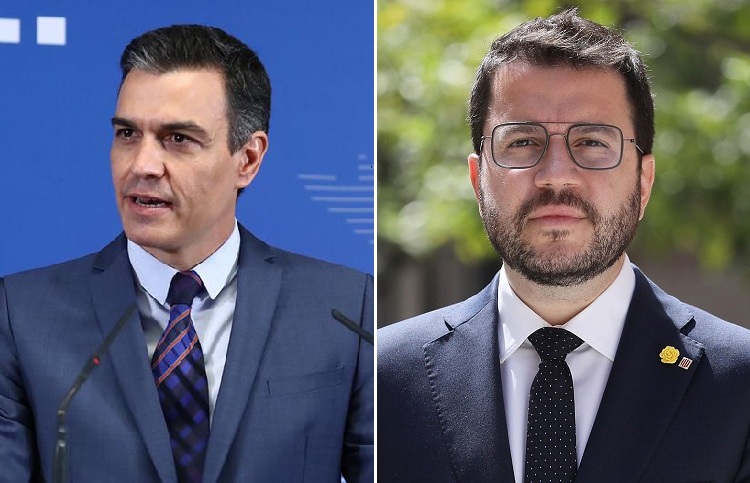Ángel Collado
Pedro Sánchez’s pardons for pro-independence leaders convicted of sedition and embezzlement have managed to redouble the separatists’ challenge to the state and set a new deadline for their goal of rupture: the same two years of effective legislature that the PSOE has left in power.
The visit that the president of the Generalitat, Pere Aragonés, will make tomorrow to the Moncloa Palace will be the first act of public negotiation for the head of the Executive to test his formula of making concessions in exchange for stability and present it to society as a solution to the ‘Catalan conflict’.
At the cost of questioning the constitutional framework and insisting on a clash with state powers such as the judiciary and cornering the opposition, Sánchez and his spokespersons have already outlined their intention to offer the pro-independence supporters a new statute, a reform that entails consultation, as an alternative to a referendum on secession.
The Socialist Party’s desire to relieve ERC leaders and supporters of Carles Puigdemont of their political and criminal responsibilities, both at European and national levels, is also evident. Government pressure even reaches the Court of Auditors so that Oriol Junqueras and company do not have to return part of the public funds embezzled in their 1-O attempt, with fines of up to 5.5 million euros. It is not the unconstitutional amnesty demanded by the separatists, but it is the quickest alternative that the head of the Executive can offer before changing the Penal Code to reduce the penalties for sedition.
As in the whole tug-of-war process that is beginning, both parties, Sánchez from the Moncloa and the pro-independence supporters from the Generalitat, need to gain time and offer advances in their objectives: stability to remain in power for the PSOE and progress towards their independent republic for ERC and the heirs of the former Convergencia.
As Junqueras’ spokesman in Congress, Gabriel Rufián, explained in public and in person to Sánchez, the pardon for his boss is only the prologue to deeper concessions. The Catalan pro-independence supporters have a total of 21 MPs in Congress (350 seats) who hold the key to the government’s majority, the 155 MPs of the PSOE and Podemos, being able to pass any law.
Without the backing of the parties that govern the Generalitat, and that already brought Sánchez to power in the motion of censure against Mariano Rajoy in June 2018, “there will be no legislature”. This is what Rufián himself warned the president of the Government on behalf of Junqueras as soon as he was sworn in.
Negotiations in La Moncloa have begun under this threat, with its current tenant willing to satisfy his partners, although the socialist regional party leaders fear that they will pay the first electoral bills for these concessions in person.
After the pardons and with the next favours in place, Sánchez also risks opening up another front of conflict with the regional governments (Madrid’s at the forefront) once he puts his offer of economic and fiscal privileges for the Generalitat of Catalonia on the table.
The design of a new model of autonomous state, “asymmetrical federal” as the Party of Catalan Socialists once stated, may take the two years that Sánchez needs, but the “fiscal homogenisation” proposed by Sánchez’s government can be processed in Congress in a quarter of a year. It is the quickest way to please the pro-independence supporters obsessed with competition with the Community of Madrid because it has lower taxes than the rest of the autonomous governments, attracts more investment and offers more prosperity and economic freedom.
Isabel Díaz Ayuso knows that at the negotiating table of Sánchez and Aragonés there will be talk of the regional distribution of European investments and regional taxation, and for this reason she proclaims in advance that Madrid is not willing to pay for “the independence party”. And having inaugurated the system of ‘bilateral’ relations between the central executive and the autonomous governments, the Andalusian government is also calling for it.
Sánchez is trying to secure the support of his secessionist allies at the cost of opening up new fronts of conflict in all areas of the state and clashing with the rest of the powers.







